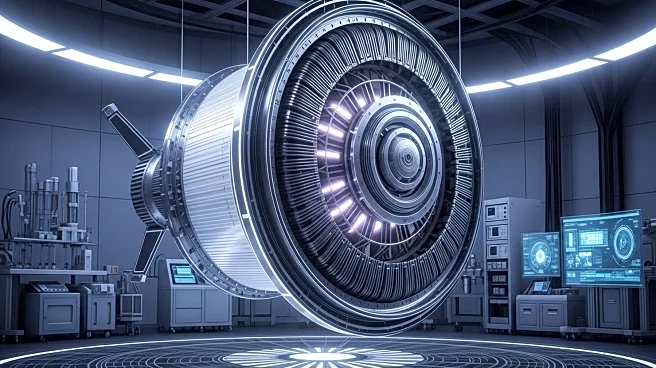What is the story about?
What's Happening?
Scientists are exploring the potential of nuclear-powered rockets to facilitate faster space travel, particularly to Mars and beyond. The new design, known as the centrifugal nuclear thermal rocket (CNTR), utilizes liquid uranium in a rotating cylinder to maximize fission reactions, thereby increasing efficiency. This technology promises to double the specific impulse of previous nuclear thermal rocket designs and quadruple the efficiency of chemical rockets. Although no nuclear-powered rocket has flown yet, space agencies are increasingly considering nuclear propulsion to shorten interplanetary voyages, which could reduce health risks associated with prolonged space travel. The CNTR could enable missions to the moon and Mars to be completed in significantly less time than current chemical rockets allow.
Why It's Important?
The development of CNTR technology could revolutionize space travel by reducing the time required for missions, thereby minimizing health risks for astronauts. This advancement could make interplanetary travel more feasible and routine, potentially opening new frontiers for exploration. The ability to travel faster and farther on less fuel could also lead to more efficient and cost-effective missions. As space agencies continue to explore nuclear propulsion, this technology could play a crucial role in future space exploration strategies, impacting industries related to aerospace, technology, and international collaboration.
What's Next?
The CNTR concept is currently in the design phase, with researchers aiming for readiness within the next five years. If successful, this technology could be implemented in space missions by the middle of the century, significantly altering the landscape of space exploration. As interest in nuclear thermal propulsion grows, further research and development are expected, potentially leading to collaborations between space agencies and advancements in related technologies.
Beyond the Headlines
The use of nuclear power in space has been controversial, with past projects exploring explosive possibilities. However, CNTR offers a safer alternative, potentially avoiding the risks associated with chemical rockets. This development could also influence discussions on the ethical implications of nuclear technology in space, as well as its environmental impact.














